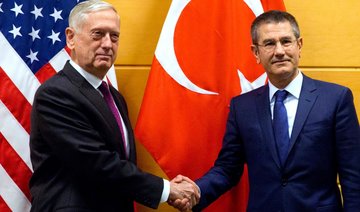ANKARA: US Secretary of State Rex Tillerson arrived in Turkey on Thursday for talks with President Recep Tayyip Erdogan, seeking to ease tensions between the NATO allies that reached new heights over Ankara’s ongoing operation inside Syria.
A prime task of President Donald Trump’s top diplomat will be to allay Turkish anger over US policy in Syria, a dispute which has ignited the biggest crisis in bilateral ties since the 2003 Iraq war.
The former chief of energy giant Exxon Mobil, who is on a multi-leg tour of the Middle East, headed to talks with Erdogan at his presidential palace after landing in Ankara from Beirut.
Tillerson will meet Foreign Minister Mevlut Cavusoglu on Friday morning.
Turkey’s operation against the People’s Protection Units (YPG) Kurdish militia in the Afrin region of Syria has added a potentially insurmountable new problem to an increasingly rough bilateral relationship.
Analysts said the level of tension was similar to 2003 when Turkey refused to let US troops operate from its territory for the Iraq war, or even the aftermath of Ankara’s invasion of Cyprus in 1974.
Turkey’s operation against the YPG, which Ankara blacklists as a terror group, has seen Turkish troops fighting a militia which is closely allied with the US in the battle against Daesh militants.
Speaking in Beirut hours before his meeting with Erdogan, Tillerson denied Washington ever gave heavy weaponry to the YPG and thus could not gather up such arms, as desired by Ankara.
“We have never given heavy arms to the YPG so there is none to take back,” Tillerson said.
Erdogan earlier this month accused Washington of sending in thousands of truckloads and planeloads of weapons to the YPG in Syria, asking why the US still had a presence there if the militants had been defeated.
Moreover, Turkey said on Thursday it had demanded the US expel the YPG from forces it backs in Syria.
“We demanded this relationship be ended, I mean we want them to end all the support given to the Syrian arm of PKK, the YPG,” Turkish Defense Minister Nurettin Canikli told reporters in a briefing in Brussels, a day after meeting US Defense Secretary Jim Mattis on the sidelines of a NATO meeting.
“We demanded this structure be removed from SDF,” he said.
And Erdogan has further upped the ante by warning US troops to leave Manbij, a YPG-held town east of Afrin, raising fears of a clash between the allies.
He also warned that the US risked being dealt an “Ottoman slap” in Syria — a backhand thwack which, according to legend, could kill an opponent at a stroke.
For Ankara, the YPG is a branch of the outlawed Kurdistan Workers’ Party (PKK), which is blacklisted as a terror outfit by the US and the EU.
But for Washington, the YPG is an ally against Daesh militants and Turkey’s operation is a distraction from efforts to ensure the extremists are permanently defeated.
Speaking ahead of the visit, a senior State Department official said “eyes had to be on” the defeat of Daesh.
“It’s complicated enough. Let’s not make it more so.”
But Cavusoglu this week warned Washington that ties were at a “critical point” at which relations would “be fixed or... completely damaged.”
The squabble over Syria is, however, just one of a litany of issues burdening Turkey-US relations.
Ties were damaged after the failed coup of 2016 with Turkey stung by a perceived lack of US solidarity and angered by Washington’s refusal to extradite Fethullah Gulen, a Pennsylvania-based cleric blamed for ordering the putsch.
There is still no US ambassador to Turkey after the departure of John Bass last year, and it was only in December that the two sides ended a row following tit-for-tat suspensions of visa services.
Last month, Ankara reacted furiously to the conviction in New York of Turkish banker Mehmet Hakan Atilla on charges of violating sanctions against Iran.
And Washington has expressed concern that several of its citizens — as well as at least two Turkish employees of US missions — have been caught up in the post-coup crackdown.
Last week, NASA scientist Serkan Golge, a dual national, was jailed for seven-and-a-half years for being a member of Gulen’s movement, with the State Department saying he had been convicted “without credible evidence.”
Another case is that of US pastor Andrew Brunson, who ran a church in Izmir, who has been held on similar charges since October 2016.
Such tensions have hit Turkish public opinion, with 83 percent holding unfavorable views of the US, a Center for American Progress poll showed this week.
Tillerson bids to ease Turkey tensions in Erdogan talks
Tillerson bids to ease Turkey tensions in Erdogan talks

US sending Israel 20,000 assault rifles that Biden had delayed, say sources

- The rifle sale is a small transaction next to the billions of dollars worth of weapons that Washington supplies to Israel
- The March 6 congressional notification said the US government had taken into account “political, military, economic, human rights, and arms control considerations“
WASHINGTON: The Trump administration moved forward with the sale of more than 20,000 US-made assault rifles to Israel last month, according to a document seen by Reuters and a source familiar with the matter, pushing ahead with a sale that the administration of former president Joe Biden had delayed over concerns they could be used by extremist Israeli settlers.
The State Department sent a notification to Congress on March 6 for the $24 million sale, saying the end user would be the Israeli National Police, according to the document.
The rifle sale is a small transaction next to the billions of dollars worth of weapons that Washington supplies to Israel. But it drew attention when the Biden administration delayed the sale over concerns that the weapons could end up in the hands of Israeli settlers, some of whom have carried out attacks on Palestinians in the Israeli-occupied West Bank.
The Biden administration has imposed sanctions on individuals and entities accused of committing violence in the Israeli-occupied West Bank, which has seen a rise in settler attacks on Palestinians.
On his first day in office on January 20, Trump issued an executive order rescinding US sanctions on Israeli settlers in a reversal of US policy. Since then, his administration has approved the sale of billions of dollars worth of weapons to Israel.
The March 6 congressional notification said the US government had taken into account “political, military, economic, human rights, and arms control considerations.”
The State Department did not respond to a request for comment when asked if the administration sought assurances from Israel on the use of the weapons.
CLOSE TIES
Since a 1967 Middle East war, Israel has occupied the West Bank, which Palestinians want as the core of an independent state, and has built settlements that most countries deem illegal. Israel disputes this, citing historical and biblical ties to the land.
Settler violence had been on the rise prior to the eruption of the Gaza war, and has worsened since the conflict began over a year ago.
Trump has forged close ties to Netanyahu, pledging to back Israel in its war against Hamas in the Gaza Strip. His administration has in some cases pushed ahead with Israel arms sales despite requests from Democratic lawmakers that the sales be paused until they received more information.
The US Senate on Thursday overwhelmingly rejected a bid to block $8.8 billion in arms sales to Israel over human rights concerns, voting 82-15 and 83-15 to reject two resolutions of disapproval over sales of massive bombs and other offensive military equipment.
The resolutions were offered by Senator Bernie Sanders of Vermont, an independent who caucuses with Democrats.
The rifle sale had been put on hold after Democratic lawmakers objected and sought information on how Israel was going to use them. The congressional committees eventually cleared the sale but the Biden administration kept the hold in place.
The latest episode in the decades-old Israeli-Palestinian conflict began with a Hamas attack on Israeli communities on October 7, 2023 with gunmen killing 1,200 people and taking more than 250 hostages, according to Israeli tallies. Israel’s campaign has so far killed more than 50,000 Palestinians, Gaza health authorities say.
Israel’s National Security Minister Itamar Ben-Gvir, a far-right member of Prime Minister Benjamin Netanyahu’s government, oversees the Israeli police force. The Times of Israel newspaper in November 2023 reported that his ministry has put “a heavy emphasis on arming civilian security squads” in the aftermath of October 7 attacks.
Medecins Sans Frontieres ‘appalled’ by second staff member killed in Gaza within weeks

- Hussam Al Loulou died in the strike on Apr. 1 in central Gaza
GENEVA: Global medical charity Medecins Sans Frontieres said on Friday it was appalled and saddened by the killing of one of its staff by an air strike in Gaza, the second within two weeks.
Hussam Al Loulou died in the strike on Apr. 1 in central Gaza, alongside his wife and 28-year-old daughter, the organization said.
Uganda president holds talks with South Sudanese leaders to try to avoid civil war

- Goc said that the country’s leadership had assured Museveni of its commitment to implement the peace agreement
- Uganda last month deployed troops to South Sudan to support the government
NAIROBI: Uganda’s President Yoweri Museveni was expected to meet South Sudanese officials on the second day of his trip to the capital, Juba, as the UN has expressed concern of a renewed civil war after the main opposition leader was put under house arrest.
Museveni, who is among the guarantors of a 2018 peace agreement that ended a five-year civil war, held closed-door discussions with President Salva Kiir on Thursday.
South Sudan’s Foreign Minister Mohammed Abdallah Goc said that the country’s leadership had assured Museveni of its commitment to implement the peace agreement.
South Sudan’s political landscape remains fragile and recent violence between government troops and armed groups allied to the opposition have escalated tension.
Uganda last month deployed troops to South Sudan to support the government, but it was criticized by South Sudan’s main opposition party SPLM-IO, whose leader Riek Machar is under house arrest on charges of incitement.
In early March, the armed group loyal to Machar attacked a UN helicopter that was on a mission to evacuate government troops from the restive northern Upper Nile State.
Western countries including Germany and Norway have temporarily closed their embassies in Juba while the USand the UK have reduced embassy staff.
Turkiye wants no confrontation with Israel in Syria, foreign minister says

- Fidan said Israel’s actions in Syria were paving the way for future regional instability
- If the new administration in Damascus wants to have “certain understandings” with Israel, then that is their own business, he added
BRUSSELS: Turkiye wants no confrontation with Israel in Syria after repeated Israeli attacks on military sites there undermined the new government’s ability to deter threats, Turkish Foreign Minister Hakan Fidan told Reuters on Friday.
In an interview on the sidelines of a meeting of NATO foreign ministers in Brussels, Fidan said Israel’s actions in Syria — where the administration of President Ahmed Al-Sharaa is a close Turkish ally — were paving the way for future regional instability.
If the new administration in Damascus wants to have “certain understandings” with Israel, which like Turkiye is a neighbor of Syria, then that is their own business, he added.
NATO member Turkiye has fiercely criticized Israel over its attacks on Gaza since 2023, saying they amount to a genocide against the Palestinians, and has applied to join a case at the World Court against Israel while also halting all trade.
Israel denies the genocide accusations.
The animosity between the regional powers has spilled over into Syria, with Israeli forces striking Syria for weeks since a new administration took control in Damascus. Turkiye has called the Israeli strikes an encroachment on Syrian territories, while Israel has said it would not allow any hostile forces in Syria.
Asked about US President Donald Trump’s threats of military strikes against Iran, Fidan said diplomacy was needed to resolve the dispute and that Ankara did not want to see any attack taking place against its neighbor Iran.
Hungary’s ICC withdrawal no excuse not to arrest Netanyahu: Amnesty International

- Hungarian PM said his country would leave International Criminal Court after receiving Israeli counterpart this week
- ‘By welcoming Netanyahu, Hungary is effectively giving a seal of approval to Israel’s genocide’
LONDON: Amnesty International has warned Hungary that withdrawing from the International Criminal Court would not excuse it from failing to arrest Israel’s Prime Minister Benjamin Netanyahu.
Hungary’s Prime Minister Viktor Orban announced his intention for his country to leave the ICC on Thursday, saying he believed it had been “diminished into a political forum.”
He made the statement after welcoming Netanyahu to Budapest, where the Israeli premier is on an official four-day visit.
Netanyahu is the subject of an international arrest warrant, issued by the ICC, for alleged crimes committed during the war in Gaza.
Amnesty called Orban’s statement “a betrayal of all victims of war crimes,” which “undermines the protections afforded the Hungarian people, as it removes, in a year, their opportunity to seek justice at the ICC for crimes committed against them.”
In a statement, Amnesty’s Secretary-General Agnes Callamard said: “Prime Minister Orban is harbouring a wanted ICC fugitive. Benjamin Netanyahu is accused by the ICC of committing war crimes and crimes against humanity against Palestinians.
“By welcoming Netanyahu, Hungary is effectively giving a seal of approval to Israel’s genocide, namely the physical destruction of the Palestinian people in whole or in part in Gaza.
“Leaders and officials from ICC member states must not participate in undermining the ICC through meeting with Netanyahu or any other ICC fugitives who are wanted by the Court.
“Netanyahu’s shameful trip to Hungary must not become an impunity tour of other ICC member states.”
Orban said he would ignore the ICC arrest warrant after it was issued last year, inviting Netanyahu personally to visit Hungary.
Withdrawal from the ICC is possible under Article 127 of the Rome Statute but takes a year to complete. During that time, Hungary’s legal obligations to the ICC remain in place.
“Hungary’s purported withdrawal from the ICC is a brazen and futile attempt to evade international justice and to stymy the ICC’s work,” Callamard said.
“This cynical announcement does not change the fact that Hungary still has a fundamental obligation to arrest and surrender Benjamin Netanyahu to the ICC.
“Any withdrawal would take effect in one year and must not distract from Hungary’s international legal obligations.
“The EU institutions and member states must be unequivocal about what this visit is: a direct attack by Hungary to undermine the ICC and its work, weaken the European Union at a time when it needs to stand strong and united, and an insult to all victims who are looking for justice.”
Callamard added: “The EU and all ICC member states must urgently call on Hungary to arrest and surrender Netanyahu and firmly commit to defending the Court from insidious threats to international justice which a visit of this kind represents.
“This moral bankruptcy must be stopped before it spirals into further damage for the international rules-based order.”
Amnesty noted that during the conflict so far at least 50,140 Palestinians have been killed, nearly 114,000 injured, and 1.9 million forcibly displaced by Israeli military activity.





















